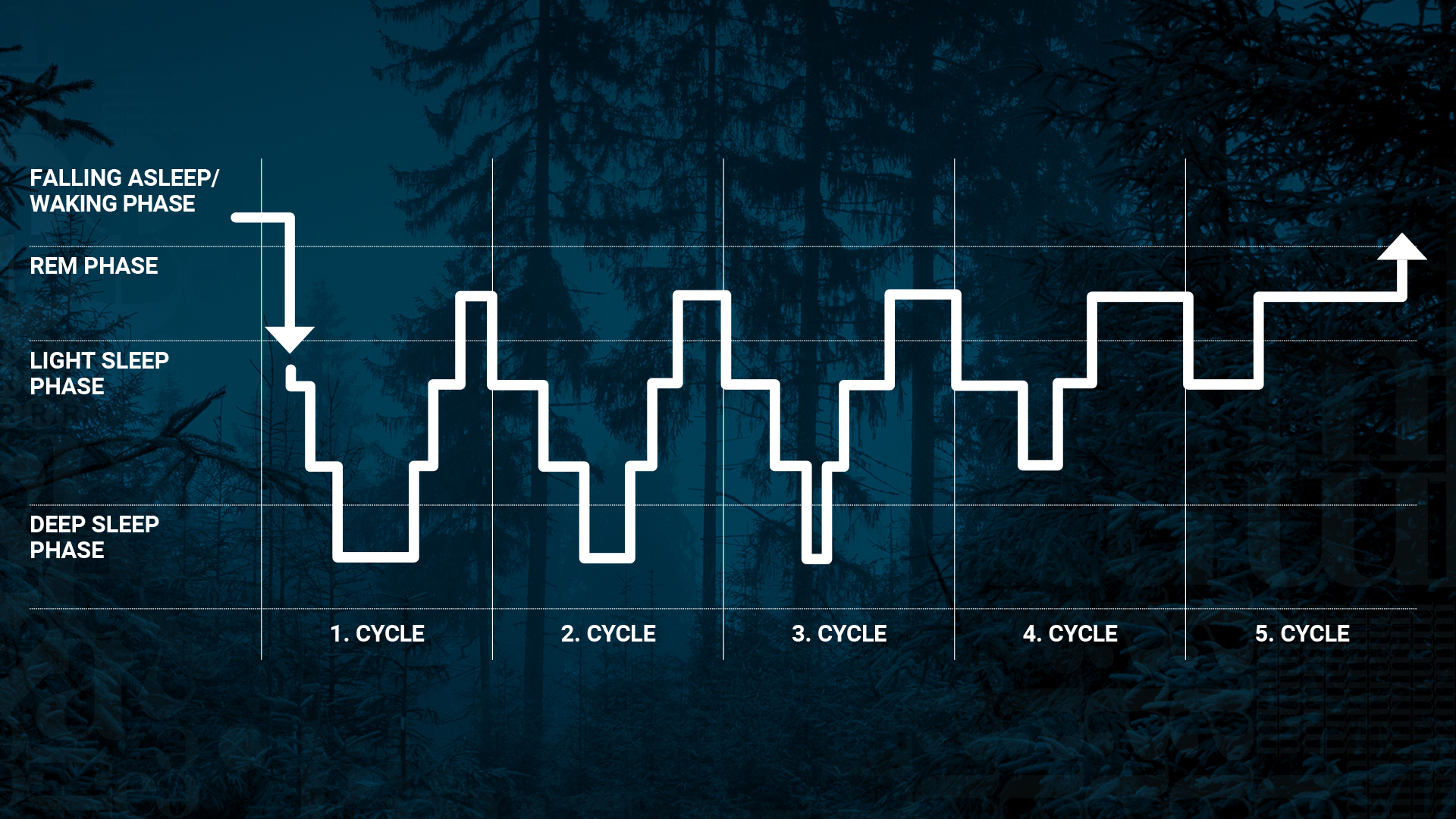HOW DOES
“SLEEP”
WORK?


Sleep is much more than just rest - it is a complex process in which body and mind regenerate. Our sleep follows a fixed cycle of different phases that are repeated several times a night. But what happens during these phases, why are they so important and how can you specifically improve your sleep? Here you can find out everything you need to know to get restful and healthy sleep.
THE
"TOP FIVE":
STAGES OF SLEEP
AND CYCLE

Our sleep is divided into five sleep phases, which are repeated as a cycle and during which our body regenerates both physically and mentally. During the night, our brain unconsciously processes all the things we have experienced and learnt during the day and stores the important information in our long-term memory. Sleep disorders or lack of sleep interrupt this process. They not only exhaust us physically, but also mentally.
1. First light sleep stage
In this stage, our body begins to relax more and more: the brain shifts into a restful state, and muscle activity slows down. Sleep at this stage is still very light and superficial.

2. Second light sleep stage (non-REM)
As heart rate decreases and breathing becomes deeper and more rhythmic, the body begins to unwind. Even in this light stage of sleep, the brain starts processing impressions and experiences from the day. While this phase is not yet restorative in depth, it plays a vital role in initiating the sleep cycle.

3. and 4.: deep sleep stage (non-REM)
This is the most physically and mentally restorative stage of sleep—and also the most essential. It can be divided into moderately deep and very deep phases. Muscle and brain activity are significantly reduced, while breathing and heart rate slow down noticeably.

5. REM-Sleep
REM stands for 'rapid eye movement'—a phase characterized by quick eye movements during sleep. It is during this stage that we dream most vividly and for the longest periods. Meanwhile, the muscles are nearly paralyzed—a natural protective mechanism that prevents us from physically acting out our dreams.

GOOD & HEALTHY
SLEEP IS THEREFORE
ONE THING ABOVE ALL:
UNDISTURBED SLEEP.

Please do not disturb!
On average, we wake up briefly 10-30 times a night - but if we then go back to sleep immediately, this does not disturb our healthy sleep rhythm.
With sleep disorders, however, the sleep rhythm becomes confused and the five sleep phases no longer follow each other seamlessly. The phase of falling asleep is then often excessively long, and there are frequent, prolonged awakenings that disrupt the sleep cycle. The result: you feel both physically and mentally exhausted the next morning.
FREQUENT QUESTIONS
ABOUT SLEEP
FAQ
Sleep is essential for physical and mental regeneration. While we sleep, our brain processes information, our immune system strengthens, and the body recovers from the stresses of the day.
Sleep consists of five stages: falling asleep, light sleep, deep sleep (divided into moderately deep and very deep sleep), and the REM phase. These stages repeat in cycles of approximately 90 minutes.
The optimal amount of sleep varies depending on age and individual needs. Adults typically require 7–8 hours of sleep per night, while children and adolescents need more.
Sleep deprivation can lead to concentration problems, a weakened immune system, and, in the long term, even serious health issues such as cardiovascular diseases.
Establishing a consistent sleep routine, creating a comfortable sleep environment, and avoiding electronic devices before bedtime can help optimize sleep. A suitable mattress and a good pillow also play an important role.
ALL
THAT'S NEEDED FOR
GOOD SERVICE

CUSTOMER SERVICE
This is how you can reach us:
Call times
Monday to Friday
08:00 - 17:00

FIND A DEALER
Specialist and furniture retailers
Find your favourite retailer quickly and reliably:
Our dealer search immediately shows all femira dealers in your area.

DOWNLOADS
Customer Service
All important documents at a glance:
You will find everything you need to know about your femira product here.
Cookie settings
Our website uses technically necessary cookies, which must be set so that this website can be displayed correctly. In addition, we use statistics cookies as well as marketing cookies to track the success of this website. You can edit the cookie settings at any time by clicking "Cookies" in the footer. If you no longer wish to consent to cookies for statistics and/or marketing, deactivate the checkboxes. For more information, please see our privacy policy.
Further details on the cookies used by us or by third parties on our website can be found here.




